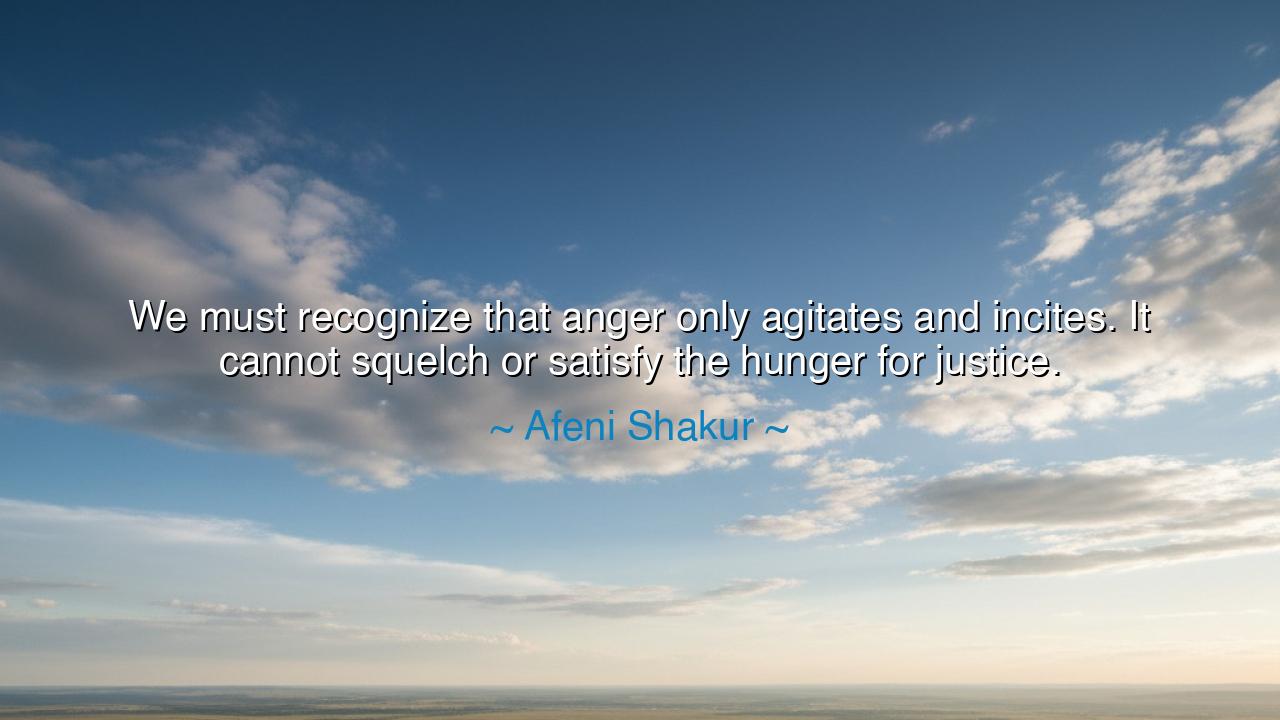
We must recognize that anger only agitates and incites. It cannot
We must recognize that anger only agitates and incites. It cannot squelch or satisfy the hunger for justice.






Host: The evening light had softened, casting long shadows across the room as the world outside began to settle into the quiet of night. Jack sat near the window, his gaze distant, absorbed in his thoughts. The quiet of the moment seemed to echo the peace that was beginning to settle in the space between them. Jeeny sat across from him, a book open but largely forgotten, her mind clearly elsewhere, lost in the words of Afeni Shakur that Jack had just shared.
Jeeny: “I’ve been thinking about what Afeni Shakur said: ‘We must recognize that anger only agitates and incites. It cannot squelch or satisfy the hunger for justice.’ It’s a powerful statement, isn’t it? The idea that anger can’t bring the kind of justice we seek—it just stirs things up, but doesn’t lead to any real resolution.”
Jack: “It’s a hard truth, though. Anger feels like a natural response when we’re confronted with injustice, doesn’t it? It’s like a reflex—something that makes us want to act, to take control. When we feel that something is wrong, when we feel that the system is stacked against us, anger is the first thing that rises up. But what Afeni Shakur is saying is that anger isn’t the tool for real change.”
Jeeny: “Yes, and I think the real insight is recognizing that anger, while it may feel like it’s driving us toward something, isn’t what will actually bring about the change we seek. Justice isn’t a product of rage—it’s a product of thought, of action, and of understanding. Anger doesn’t solve the problem—it just makes everything more volatile. It’s like throwing gasoline on a fire—you might feel like you’re doing something, but it only makes things worse.”
Host: The air in the room seemed to still, the weight of their words hanging in the space between them. Jack’s eyes moved slowly from the window back to Jeeny, the understanding beginning to take root, but still hesitant, like he was searching for something deeper.
Jack: “But what about when anger feels like it’s justified? When you’re faced with something so wrong, something that can’t be ignored? Sometimes it feels like anger is the only force strong enough to push back, to demand that things change.”
Jeeny: “I get that, Jack. Anger is a response to feeling powerless, to seeing something unjust and not knowing how to deal with it. But Afeni Shakur is reminding us that justice doesn’t come from reaction—it comes from strategy. It’s about finding a way to transform that anger into something that builds, not destroys. Justice requires patience, persistence, and understanding. It’s about creating lasting change, not just an emotional outburst.”
Jack: “So, you’re saying it’s not about denying anger, but about channeling it in a way that’s more constructive, more focused?”
Jeeny: “Exactly. Anger isn’t wrong, but if we let it take over, if we let it be the driving force, we’ll miss the opportunity to create a true solution. The real work comes from looking at the root of the injustice, understanding it, and using our energy to create something sustainable, something that leads to real change. Anger might fuel us, but it’s wisdom and action that get us to where we need to go.”
Host: The stillness between them grew deeper, the weight of their conversation hanging like a quiet understanding in the air. Jack’s fingers now rested on the table, a slight tension in his posture as he absorbed Jeeny’s words. The conversation had moved from a question of reaction to something more fundamental—a deeper reflection on how to channel the energy of anger into something that could truly foster justice.
Jack: “I see it now. It’s not that anger is bad—it’s that it’s not enough on its own. We need to move past the anger, use it as fuel, but then step back and look at how we can act with intention, with purpose.”
Jeeny: “Exactly. Anger is part of the process—it tells us something is wrong, that something needs to change. But it’s through understanding, through creating a path forward, that we make real progress. Justice isn’t about getting even, or reacting impulsively. It’s about creating a foundation for something better.”
Host: The room felt quieter now, the weight of their exchange settling in, like a truth finally understood. Anger, though often a valid response, couldn’t be the final answer. It was the action that followed, the focus on creating real, meaningful change, that would lead to justice. The hunger for justice could not be satisfied by mere emotion—it required something deeper, something lasting. And it was through that understanding that true change could begin to unfold.






AAdministratorAdministrator
Welcome, honored guests. Please leave a comment, we will respond soon